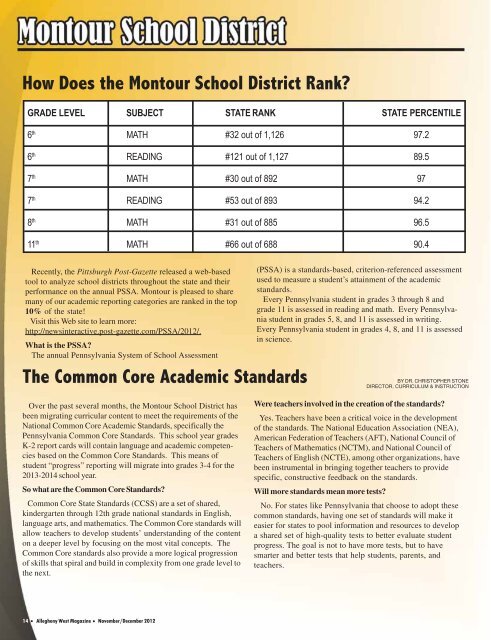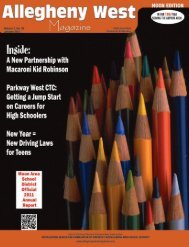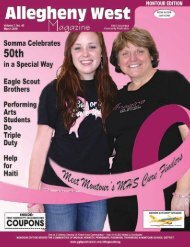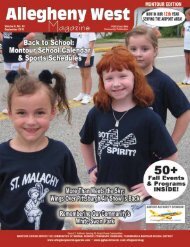Download - Allegheny West Magazine
Download - Allegheny West Magazine
Download - Allegheny West Magazine
You also want an ePaper? Increase the reach of your titles
YUMPU automatically turns print PDFs into web optimized ePapers that Google loves.
Recently, the Pittsburgh Post-Gazette released a web-basedtool to analyze school districts throughout the state and theirperformance on the annual PSSA. Montour is pleased to sharemany of our academic reporting categories are ranked in the top10% of the state!Visit this Web site to learn more:http://newsinteractive.post-gazette.com/PSSA/2012/.What is the PSSA?The annual Pennsylvania System of School Assessment(PSSA) is a standards-based, criterion-referenced assessmentused to measure a student’s attainment of the academicstandards.Every Pennsylvania student in grades 3 through 8 andgrade 11 is assessed in reading and math. Every Pennsylvaniastudent in grades 5, 8, and 11 is assessed in writing.Every Pennsylvania student in grades 4, 8, and 11 is assessedin science.BY DR. CHRISTOPHER STONEDIRECTOR, CURRICULUM & INSTRUCTIONOver the past several months, the Montour School District hasbeen migrating curricular content to meet the requirements of theNational Common Core Academic Standards, specifically thePennsylvania Common Core Standards. This school year gradesK-2 report cards will contain language and academic competenciesbased on the Common Core Standards. This means ofstudent “progress” reporting will migrate into grades 3-4 for the2013-2014 school year.So what are the Common Core Standards?Common Core State Standards (CCSS) are a set of shared,kindergarten through 12th grade national standards in English,language arts, and mathematics. The Common Core standards willallow teachers to develop students’ understanding of the contenton a deeper level by focusing on the most vital concepts. TheCommon Core standards also provide a more logical progressionof skills that spiral and build in complexity from one grade level tothe next.Were teachers involved in the creation of the standards?Yes. Teachers have been a critical voice in the developmentof the standards. The National Education Association (NEA),American Federation of Teachers (AFT), National Council ofTeachers of Mathematics (NCTM), and National Council ofTeachers of English (NCTE), among other organizations, havebeen instrumental in bringing together teachers to providespecific, constructive feedback on the standards.Will more standards mean more tests?No. For states like Pennsylvania that choose to adopt thesecommon standards, having one set of standards will make iteasier for states to pool information and resources to developa shared set of high-quality tests to better evaluate studentprogress. The goal is not to have more tests, but to havesmarter and better tests that help students, parents, andteachers.
















